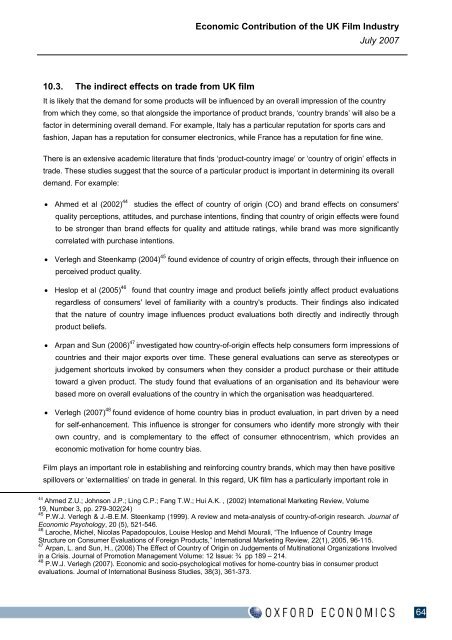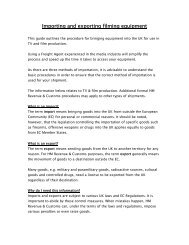The Economic Impact of the UK Film Industry - BFI - British Film ...
The Economic Impact of the UK Film Industry - BFI - British Film ...
The Economic Impact of the UK Film Industry - BFI - British Film ...
You also want an ePaper? Increase the reach of your titles
YUMPU automatically turns print PDFs into web optimized ePapers that Google loves.
10.3. <strong>The</strong> indirect effects on trade from <strong>UK</strong> film<br />
<strong>Economic</strong> Contribution <strong>of</strong> <strong>the</strong> <strong>UK</strong> <strong>Film</strong> <strong>Industry</strong><br />
July 2007<br />
It is likely that <strong>the</strong> demand for some products will be influenced by an overall impression <strong>of</strong> <strong>the</strong> country<br />
from which <strong>the</strong>y come, so that alongside <strong>the</strong> importance <strong>of</strong> product brands, ‘country brands’ will also be a<br />
factor in determining overall demand. For example, Italy has a particular reputation for sports cars and<br />
fashion, Japan has a reputation for consumer electronics, while France has a reputation for fine wine.<br />
<strong>The</strong>re is an extensive academic literature that finds ‘product-country image’ or ‘country <strong>of</strong> origin’ effects in<br />
trade. <strong>The</strong>se studies suggest that <strong>the</strong> source <strong>of</strong> a particular product is important in determining its overall<br />
demand. For example:<br />
• Ahmed et al (2002) 44 studies <strong>the</strong> effect <strong>of</strong> country <strong>of</strong> origin (CO) and brand effects on consumers'<br />
quality perceptions, attitudes, and purchase intentions, finding that country <strong>of</strong> origin effects were found<br />
to be stronger than brand effects for quality and attitude ratings, while brand was more significantly<br />
correlated with purchase intentions.<br />
• Verlegh and Steenkamp (2004) 45 found evidence <strong>of</strong> country <strong>of</strong> origin effects, through <strong>the</strong>ir influence on<br />
perceived product quality.<br />
• Heslop et al (2005) 46 found that country image and product beliefs jointly affect product evaluations<br />
regardless <strong>of</strong> consumers' level <strong>of</strong> familiarity with a country's products. <strong>The</strong>ir findings also indicated<br />
that <strong>the</strong> nature <strong>of</strong> country image influences product evaluations both directly and indirectly through<br />
product beliefs.<br />
• Arpan and Sun (2006) 47 investigated how country-<strong>of</strong>-origin effects help consumers form impressions <strong>of</strong><br />
countries and <strong>the</strong>ir major exports over time. <strong>The</strong>se general evaluations can serve as stereotypes or<br />
judgement shortcuts invoked by consumers when <strong>the</strong>y consider a product purchase or <strong>the</strong>ir attitude<br />
toward a given product. <strong>The</strong> study found that evaluations <strong>of</strong> an organisation and its behaviour were<br />
based more on overall evaluations <strong>of</strong> <strong>the</strong> country in which <strong>the</strong> organisation was headquartered.<br />
• Verlegh (2007) 48 found evidence <strong>of</strong> home country bias in product evaluation, in part driven by a need<br />
for self-enhancement. This influence is stronger for consumers who identify more strongly with <strong>the</strong>ir<br />
own country, and is complementary to <strong>the</strong> effect <strong>of</strong> consumer ethnocentrism, which provides an<br />
economic motivation for home country bias.<br />
<strong>Film</strong> plays an important role in establishing and reinforcing country brands, which may <strong>the</strong>n have positive<br />
spillovers or ‘externalities’ on trade in general. In this regard, <strong>UK</strong> film has a particularly important role in<br />
44<br />
Ahmed Z.U.; Johnson J.P.; Ling C.P.; Fang T.W.; Hui A.K. , (2002) International Marketing Review, Volume<br />
19, Number 3, pp. 279-302(24)<br />
45<br />
P.W.J. Verlegh & J.-B.E.M. Steenkamp (1999). A review and meta-analysis <strong>of</strong> country-<strong>of</strong>-origin research. Journal <strong>of</strong><br />
<strong>Economic</strong> Psychology, 20 (5), 521-546.<br />
46<br />
Laroche, Michel, Nicolas Papadopoulos, Louise Heslop and Mehdi Mourali, “<strong>The</strong> Influence <strong>of</strong> Country Image<br />
Structure on Consumer Evaluations <strong>of</strong> Foreign Products,” International Marketing Review, 22(1), 2005, 96-115.<br />
47<br />
Arpan, L. and Sun, H., (2006) <strong>The</strong> Effect <strong>of</strong> Country <strong>of</strong> Origin on Judgements <strong>of</strong> Multinational Organizations Involved<br />
in a Crisis. Journal <strong>of</strong> Promotion Management Volume: 12 Issue: ¾ pp 189 – 214.<br />
48<br />
P.W.J. Verlegh (2007). <strong>Economic</strong> and socio-psychological motives for home-country bias in consumer product<br />
evaluations. Journal <strong>of</strong> International Business Studies, 38(3), 361-373.<br />
64

















